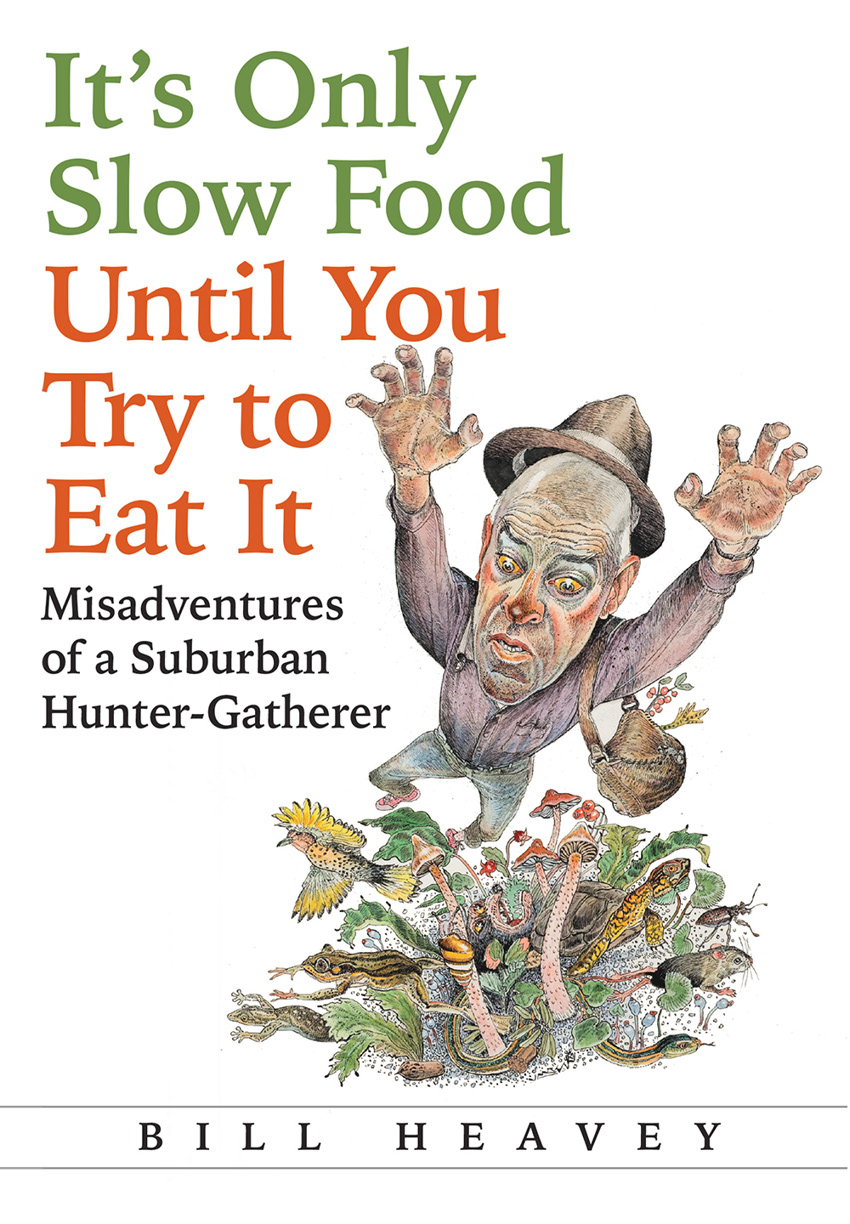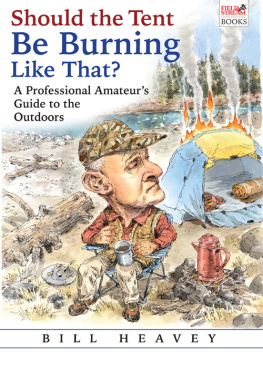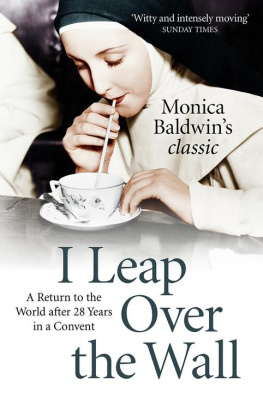
Its Only
Slow Food
Until You
Try to Eat It
Also by Bill Heavey
If You Didnt Bring Jerky, What Did I Just Eat?:
Misadventures in Hunting, Fishing, and the Wilds of Suburbia
Its Only
Slow Food
Until You
Try to Eat It
Misadventures of a Suburban
Hunter-Gatherer
Bill Heavey

Atlantic Monthly Press
New York
Copyright 2013 by Bill Heavey
All rights reserved. No part of this book may be reproduced in any form or by any electronic or mechanical means, including information storage and retrieval systems, without permission in writing from the publisher, except by a reviewer, who may quote brief passages in a review. Scanning, uploading, and electronic distribution of this book or the facilitation of such without the permission of the publisher is prohibited. Please purchase only authorized electronic editions, and do not participate in or encourage electronic piracy of copyrighted materials. Your support of the authors rights is appreciated. Any member of educational institutions wishing to photocopy part or all of the work for classroom use, or anthology, should send inquiries to Grove/Atlantic, Inc., 841 Broadway, New York, NY 10003 or .
Jacket illustrations Jack Unruh
Published simultaneously in Canada
Printed in the United States of America
ISBN-13: 978-0-8021-9348-3
Atlantic Monthly Press
an imprint of Grove/Atlantic, Inc.
841 Broadway
New York, NY 10003
Distributed by Publishers Group West
www.groveatlantic.com
For Michelle
Contents
:
How Hard Could it Be?
Blood, Guts, and Other Signs of Spring
A Savory Little Fellow Rediscovered
The Homicidal Gardener
Of Cattail Disasters and the Blue Goose Incident
Enter the Girl, Sour Cherry Pie, and Five Bites of My Own Lawn
Among the Cajuns
Of Closet Carnivores and the Gospel of Small Fish
You Dont Want to Grab Anything Has Red Eyes
People of the Caribou
Dont Ever Let That Man Near a Stove
Introduction:
How Hard Could it Be?
As the buck rises from its bed in the underbrush forty yards away, every cell in my body decides to attempt a jailbreak. Im twenty-four feet up a tulip poplar in my hunting stand, where Ive been concealed for the past four hours. I would very much like to come to my feet but my legs are shaking too hard. They arent my legs anymore.
Im drowning. I simply cant suck in air fast enough to keep up with my bodys needs. And I havent moved a muscle. Meanwhile, the small percentage of brain still under my control is grappling with the fact that Ive been sitting as motionless as possible all afternoon, watching and waiting for a deer, and this buck has been here the whole time .
The interruption in muscle service shows no sign of letting up. I want to stand. I want to be able to pull back the string of my bow and be ready should the deer come my way. But first somebody needs to persuade my legs to stop auditioning for A Chorus Line .
I double down on my efforts to pull myself together, and its the impossibility of this task, by which I realize that Im now in an out-of-body state. The deer seems to exist in a tunnel, alone and apart from all other things. I distinctly note the nap of the deers hairhow it lies in one direction along its back, the opposite direction at the juncture of chest and shoulder. The buck drops its antlered head almost to the ground and stretches its entire body. And then freezes. It becomes a lawn statue.
Im certain that the buck will hearas I canthe timpani of my heart or the way Im gulping air like they wont be making more anytime soon. I know that this is the fight-or-flight response, the bodys response to a life-or-death situation. And it would make perfect sense were I some early hominid out picking berries who suddenly found himself face-to-face with a giant hyena. But Im not. This deer poses no threat to me. Its not even aware of my existence. And if it were, it would be the one to run. But it doesnt. It just stands there.
Whence the physiological ruckus?
Its because Im hunting this deer. Ive come to these woods seeking its life. Not this particular one, but any legal deer to be found in this place. This is my third fall spent trying to kill one with a bow and arrow. Ive never come this close before. That I might carry out the act has lit up more than just the fight-or-flight response. Theres more to it than that. Because while Ive never done this before, there is nevertheless something familiar about it. As if all along Ive had this neural pathway, this hunters hardwiring inside me, but had never hooked it up until this moment. In the days to come I will reexamine these feelings and conclude that Im right, that this wiring is extant in all of us, but latent. Inactive in all but the few who choose to hunt large animals at close range. In the days to come, I will increasingly feel that Im going down a path trod by others before me.
Think about it. Anatomically modern humanspeople who look like us, minus smart phonesdate back about 200,000 years. Wed like to think were recent models, and although we are, evolutionarily speaking, thats still an awfully long time without an upgrade. For 95 percent of that time, all but the last 10,000 years, we lived in small groups of nomadic hunter-gatherers. And we survived, or didnt, by our abilities as hunters. Which means that everyone alive todayfrom the worst slob hunter to the most radical PETA activistis the direct descendant of a long line of master hunters. Because if your ancestors hadnt excelled as hunters they wouldnt have been around long enough to pass their genes on to you.
Certainly no member of the Heavey clan has hunted for four generations, which is as far back as any of us remembers. When I was growing up, the thought of becoming a hunter crossed my mind about as often as becoming a Hindu. I came to hunting latein my thirtiesand by the most circuitous of routes. As a freelance writer, I wrote travel stories, features, and profiles. I had fished in summer camps as a boy and rediscovered fishing when some friends gave me a spinning rod for my twenty-first birthday. A story I wrote about fishing the rivers around D.C. ran in the Washington Post Magazine .
In the manner of freelancers everywhere, who are always in search of larger, more lucrative markets, I sent a copy to Field & Stream . It wasnt long before I was writing regularly about fishing for the countrys oldest hook-and-bullet magazine. But fishing, the hook, was only half of what the magazine covered. If I wrote about hunting, the bullet, I could double my market. Only I didnt want to hunt with bullets. From what little I knew, it was not particularly difficult to wait in an elevated box overlooking a field of corn or soybeans for a deer to show itself and shoot it from 200 yards. This didnt appeal to me. But having to get closesay, within twenty-five yardsand using a bow and arrow, did. Not everyone thought this was a great idea. How could you kill an innocent animal? my mother asked one night over dinner. I pointed out that we were having veal. Thats different, she said.
Having no friends who hunted, I went at it solo, not the fastest way to learn. But Im stubborn and have a high tolerance for failure. I kept at it. Almost in spite of myself, I learned a lot sitting like a monk in the woods in my climbing treestand. The most surprising thing I learned was that I actually liked hunting. Id been afraid Id find it boring. It wasnt. Not at all. There was a lot more to deer hunting than Id thought. If you live in the suburbs and routinely arrive home to find deer chowing down on your expensive landscaping, killing a deer would seem about as easy as rolling down the window. After all, you can run at those deer screaming bloody murder and waving your arms, and all they do is amble off a ways, maybe into a neighbors yard, and wait for you to go inside. At which point they return and resume eating. An animal that dumb couldnt be hard to hunt, right? Successfully, I mean. As a prey species, however, whitetails are experts at reading the intentions of potential predators. Those deer you just chased know that you pose no real threat. If you did, you wouldnt be making all that noise. Real danger doesnt make a sound until its too late.
Next page









